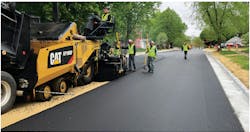Located in south central Wisconsin just north of the Illinois border, the city of Janesville is responsible for maintaining around 345 centerline miles of municipal roadways and alleys that serve a population of 65,000.
In addition, the city performs routine maintenance on 11 centerline miles of state highway that are within city limits. In 2014 the city of Janesville was rehabilitating its streets at an average of 6.3 centerline miles per year—5.2 miles resurfaced and 1.1 miles reconstructed.
When factoring in the 345 miles maintained by Janesville, the result is that the city was rehabilitating asphalt pavements every 54 or 55 years on average, according to Lisa Wolf, assistant city engineer for Janesville. “This is a completely unrealistic expectation, especially in our Midwest climate where we have multiple freeze thaw cycles and older infrastructure within the city that’s already been milled a few times,” she said.
In Wisconsin, the average service life for an asphalt surface is around 18 years for new pavement and 12 years for an overlay, according to Wolf. By the time she joined the city in 2014, the average condition of the city’s streets was declining. The city council decided that more yearly rehabilitation work would need to be done before the overall condition of its streets declined further. If left to fail, the streets would cost even more to reconstruct.
Mixing in More Recycled Material
In 2014 the Janesville City Council committed to funding 12 miles of street rehabilitation annually, doubling its program.
Part of the strategy to rehabilitate more miles per year is adjusting the mix designs for the pavements and “increasing the use of recycled materials in the asphalt,” said Wolf.
The city began working with Behnke Materials Engineering (BME), a local firm based in nearby Beloit, to develop new mixes that would incorporate higher recycled content into Janesville’s asphalt pavements. BME also helped revise the city’s specifications for resurfacing and reconstruction projects, streets in new developments, new street extensions and more. The revised specifications increase the use of reclaimed asphalt shingles (RAS), reclaimed asphalt pavement (RAP) and fractionated reclaimed asphalt pavement (FRAP) in Janesville. They also require the mixes to still meet standards for DCT, HWT and I-FIT performance testing.
To implement the high recycled content mixes, the city partnered with local asphalt producer and paving contractor Rock Road Companies Inc. “There are three mixes that we’re dealing with,” said Steve Bloedow, materials technical director for Rock Road. “Two of them are standard in Wisconsin; normal fine-graded mixes. And then there’s the MT mix, which is their highest volume mix and is kind of a deviation from any Wisconsin [DOT] mixes we’ve laid.”
The MT mix is a 75 gyration mix that’s more coarse-graded and modeled after one previously specified in Illinois, said Jon Wixom of Rock Road. “All three mixes utilize fractionated recycled coarse and fine FRAP as well as RAS to bring up those ABR (asphalt binder replacement) levels,” Wixom said. “With those elevated recycled levels we are using the ANOVA 1815 rejuvenator as our additive to help with that stiffness. It has helped with all the performance testing we have to meet.”
Janesville’s specs now allow for RAP, FRAP and RAS in both layers. “Up to 30% ABR (asphalt percent binder
replacement) in lower layer pavements and up to 55% ABR are allowed in surface layers where FRAP is required and RAS optional,” said Wolf.
Seeing the Results
The partnership with Rock Road and its asphalt product has been critical to the city of Janesville’s revised street rehabilitation program. “Their cooperation and contributions in testing, analyzing, refining and improving the mixes were invaluable,” Wolf said. “The first season of production included trial sections that used softer virgin binders and various additives to offset the harder asphalt from the RAP, FRAP and RAS. Subsequent tweaks to the specifications included requiring additives in surface mixes where the ABR is over 30%.”
Since the revised program went into effect in 2016, the city of Janesville has started reaping the benefits. Performance testing specifications ensure the high recycle mixes are resistant to cracking and rutting. In addition, prior to 2016, Wolf said, prices for hot mix asphalt were steadily rising per year. After increasing its use of recycled asphalt material, Janesville saw the price per ton for a typical local road asphalt mix drop about 6% from the 2015 price. “There are real cost savings in utilizing more recycled asphalt material,” said Wolf.
“From smaller towns in the Midwest to large metro areas around the world, rejuvenated RAP is not only consistently proving to be a reliable performance solution, but real cost savings are also being realized,” said Dr. Hassan Tabatabaee, global technology manager for asphalt solutions with Cargill’s Bioindustrial Group. “We’re excited to see results like the city of Janesville is experiencing. This data, captured over a long period of time in real world applications, can help inform the industry when developing asphalt rehabilitation strategies for the future.”
To view the case study pdf, click here.

